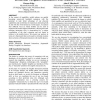Free Online Productivity Tools
i2Speak
i2Symbol
i2OCR
iTex2Img
iWeb2Print
iWeb2Shot
i2Type
iPdf2Split
iPdf2Merge
i2Bopomofo
i2Arabic
i2Style
i2Image
i2PDF
iLatex2Rtf
Sci2ools
TEI
2009
ACM
2009
ACM
Bimanual tangible interaction with mobile phones
In the context of tangibility, mobile phones are rapidly becoming sensor-rich handheld computers with the potential to take better advantage of our physical capabilities and our lifetime of experiences interacting both in and with the world around us. In this paper, we analyse four different ways in which mobiles can be used to represent and control digital information, showing that each resulting interaction style is characterized by a unique coordination of the user’s attention and two hands in relation to the mobile device. We present our analysis in terms of a framework that can be used to critically examine future schemes of bimanual interaction with mobile phones. Author Keywords Mobile Interaction, Bimanual Interaction, Augmented Reality, Tangible User Interfaces ACM Classification Keywords H5.2 Input devices and strategies
Related Content
| Added | 19 May 2010 |
| Updated | 19 May 2010 |
| Type | Conference |
| Year | 2009 |
| Where | TEI |
| Authors | Darren Edge, Alan F. Blackwell |
Comments (0)

